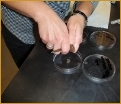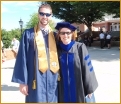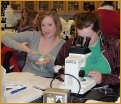BIOL 150
First Year Experience in Biology
1 credit
Fall 2013
Mondays 1:10-2:00 – Byrd Science Center 202
Dr. Carol Z. Plautz
cplautz@shepherd.edu
304-876-5773
Byrd Science Center 112
Office Hours: M 2:10-4:00 and F 1:10-4:00, and by appointment
Course Description
This course, required for Biology majors, is intended to integrate students into the life and culture of Shepherd University Biology and to prepare them with the foundations for academic success in science. Activities and topics covered include: familiarity with faculty and research conducted in the Biology department, the foundations of success in science (literature searches, writing effective laboratory reports, and scientific calculations), career options in Biology, and healthy living for a successful University experience.
Course Competencies & Learning Outcomes
By taking BIOL 150, you should be able to enhance the following skills and competencies:
1. Creative Thinking – You will be challenged to work with fellow students and to think about Biology in new ways. You will be introduced to areas in Biology with which you may be unfamiliar, and career options you may never have considered.
2. Information Literacy – Scientific research depends upon information access, and this will be covered in detail. Your ability to gather information from the literature and to make full use of library resources will feature in to this course prominently.
3. Experiential Learning – You will participate in interactive experiences that will be key to preparing you for your years of study in Biology. This may take the form of problem-solving, meeting faculty, attending seminars, on-campus excursions, or other activities.
4. Wellness – The physical and mental wellness resources available at Shepherd will be discussed and emphasized, to aid you in establishing the link between wellness and academic success in science.
5. Lifelong Learning – You will be given information and resources, learning and communication skills, and broad perspectives that will aid you in your academic life as well as your life beyond the University.
6. Critical Thinking – Mathematical problem-solving, elucidation of the meaning of scientific results, and other activities will encourage you to develop critical thinking.
LEAP Goals
Shepherd University has adopted goals from the American Association of Colleges and Universities (AAC&U) Liberal Education and America’s Promise (LEAP) initiative:
Goal No. 1: Knowledge of Human Cultures and the Physical and Natural World
*Goal No. 2: Intellectual and Practical Skills throughout the Curriculum – a focus of this course
*Goal No. 3: Personal and Social Responsibility – a focus of this course
Goal No. 4: Integrative Learning
Shepherd University Mission Statement
Shepherd University, a West Virginia public liberal arts university, is a diverse community of learners and a gateway to the world of opportunities and ideas. We are the regional center for academic, cultural, and economic opportunity. Our mission of service succeeds because we are dedicated to our core values: learning, engagement, integrity, accessibility, and community.
Attendance: You MUST attend your classes regularly and engage in the requirements for each class; otherwise, your financial aid may be revoked either partially or in full. This would result in an amount due by you to the University immediately. Please refer to http://www.shepherd.edu/faoweb/ for more details.
Course Objectives
Topics covered in this course include:
· Science Skills
o Mathematics problem-solving skills
o How to write an effective lab report
o Scientific method
o Study-skills
o Time management
o Critical thinking
o Information literacy
o How to cite works
o Library catalogs and other resources
· Integrating into Biology
o Intro to different disciplines of Biology
o Adjusting to college
o Advising – importance of advisor
o What is a Syllabus
o The Biology curriculum – when to take various courses
o GPA calculation
o Expectations of faculty
o Attendance
o Assignments each week handed in on time
o Cheating – academic integrity
o Classroom behavior
o Importance of using your shepherd.edu email account
o University policies & rules
· Career Considerations
o What can you do with a Biology degree?
o Options
o Scholarships, fellowships, internships
o Pre-med pre-vet pre-grad preparation (MCAT/GRE/etc.)
· Activities
o Seminar & workshop attendance
o Problem-solving
o Out and about on the Shepherd Campus (natural resources)
o The Wellness Center, Library, Academic Support Center
o Q&A
o Advisor meeting system (cards/signature card)
Policies
* Inclement weather: if the university is open, class will be held. Shepherd University communicates closures due to weather through several means including NBC-25 TV, several local radio stations, announcement on the website (www.shepherd.edu), and announcement on the main phone number (304) 876-5000. Commuter students should observe common sense with regard to road safety. See “Snow Policy” in the Shepherd University Student Handbook.
* Academic Integrity: Each student in this course is expected to abide by the Shepherd University Academic Integrity Procedures found on page 157 of the Student Handbook, http://www.shepherd.edu/students/studenthandbook.pdf.
* Your phone is not to be seen, heard, or used (this includes text-messaging!) during class or lab (one exception: if you need it for emergency contact, put it in your pocket on “vibrate”).
*Attend class and be on time.
Disability Support Services at Shepherd University believes that every student should succeed, and works closely with students to meet their needs. Students requesting any disability related accommodation should contact the Disability Coordinator at 304-876-5453. This includes students with learning disabilities needing classroom accommodations, students requesting specific housing accommodations for health-related reasons, and all other disability accommodations. Accommodations must be documented and provided to instructors. Please see http://www.shepherd.edu/mcssweb/dss/default.html for more information.
Grading
Attendance and Participation 20%
Assignments 60%
Projects (two) 20%
Approximate Course Schedule
subject to change at instructor discretion, especially due to weather (see Oct 28)
|
Class Meeting
|
Topic
|
|
Aug 26
|
Syllabus, Introductions, Student Information Sheets
|
|
Sept 2
|
NO CLASS – Labor Day Holiday
|
|
Sept 9
|
Dietary Wellness – guest lecture
|
|
Sept 16
|
Test of Scientific Literacy; Scientific Method, experimentation and lab reports
|
|
Sept 23
|
Information Literacy and Library Resources; Project #1 due
|
|
Sept 30
|
Counseling Podcast and [optional] Meditation Monday; no meeting
|
|
Oct 7
|
Scale and Measurements – problem-solving and mathematical skills
|
|
Oct 14
|
College Success – planning ahead, advisement
|
|
Oct 21
|
Critical thinking, lab notebooks, midterm grades
|
|
Oct 28
|
Nature Walk – around Shepherd University
|
|
Nov 4
|
Career Week – what can you do with a Biology major?
|
|
Nov 11
|
Critical Thinking Puzzles
|
|
Nov 18
|
Learning styles, study skills, test-taking; course evals
|
|
Nov 25
|
NO CLASS – Thanksgiving Week
|
|
Dec 2
|
Project #2 due (presentations in-class)
|


